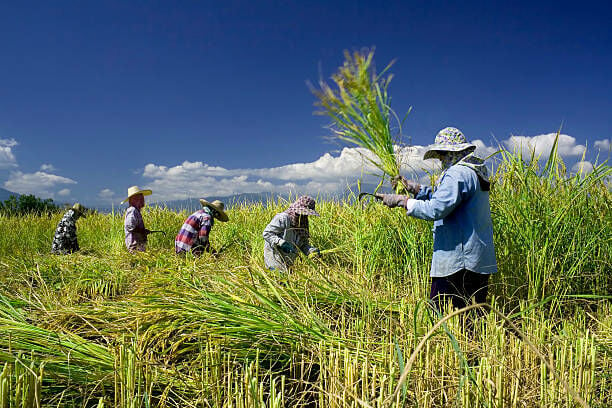Thai rice exporters stir in choppy waters as challenges loom ahead

Rice exporters in Thailand are bracing for a challenging year ahead due to a host of risk factors, including fluctuating exchange rates, waning competitiveness of Thai rice, fierce price competition, the potential impact of the El Niño weather phenomenon, and India’s restrictive export policies, as reported by the Thai Rice Exporters Association.
The association’s honorary president, Chookiat Ophaswongse, referred to data from the US Department of Agriculture that suggests a steady global milled rice production of 513 million tonnes for this year. The major contributors are China with an output of 144 million tonnes and India with 132 million tonnes. Thailand’s production is anticipated to align with last year’s figure, close to 20 million tonnes.
However, Chookiat predicts a slight decrease in Thailand’s rice exports, projecting around 7.5 million tonnes valued at 150 billion baht, down from last year’s 8.7 million tonnes valued at 178 billion baht. Despite the drop, Thailand still held the position of the world’s second-largest rice exporter in the previous year, outpaced only by India exporting 16.5 million tonnes, Chookiat said.
“There is a risk for Thailand to be able to maintain its second position in rice exports, as Vietnam is showing significant growth in its rice exports. Vietnam, typically exporting around 6 million tonnes annually, surpassed 8.1 million tonnes in 2023.”
He further explained that the Thai government’s plans to enhance government-to-government (G-to-G) rice deals have become increasingly difficult. This is due to a shift in purchasing methods by rice-buying countries, which now prefer private entities to manage rice imports and levy import taxes to support their farmers. An example of this is the Philippines, which opted for a more flexible approach, reported Bangkok Post.
The G-to-G processes in Thailand, involving the National Rice Policy Committee, the Attorney-General’s Office and the Cabinet, take over two months to finalise contracts. In contrast, the private sector can make decisions within a week.
Exchange rate volatility
Apart from these, Thai rice exports are threatened by other risks such as exchange rate volatility and potential changes in India’s rice export restrictions, which could affect global prices. He emphasised the need to monitor the impact of El Niño on production levels.
Charoen Laothammatas, the president of the Thai Rice Exporters Association, said that the price of Thai rice is influenced by both production and export conditions, affecting domestic paddy prices in turn.
Data from the Foreign Trade Department’s rice export permits reveal that Thailand exported over 1 million tonnes in the first month of 2024, a 44% increase from the previous year. If this export trend continues for several months, it will undoubtedly have a positive impact on domestic prices.
Charoen also highlighted the need for the government’s attention towards exchange rate stability and the enhancement of Thailand’s competitiveness in rice. This includes developing new rice varieties demanded by the market, with high yields per rai to compete with Vietnam and India, in line with the advancement of irrigation systems.
He further stressed the importance of focusing on transportation costs, especially considering the significant fourfold rise in shipping freight rates from the previous year to US$4,000-6,000 per container to Europe and the US.
In related news, Thailand’s rice exports are anticipated to drop by 14.4% due to production reduction and global competition; efforts made to stimulate exports include trade conventions and market expansion initiatives.
Latest Thailand News
Follow The Thaiger on Google News:


























